Chapter 8 quotes great gatsby – Chapter 8 quotes from The Great Gatsby offer a captivating glimpse into the novel’s intricate tapestry of themes, symbolism, and character development. As we delve into these profound words, we uncover a world of love, loss, and the elusive nature of the American Dream.
The quotes in this chapter provide a lens through which we can examine the complexities of Gatsby’s character, the societal norms of the Roaring Twenties, and the enduring legacy of Fitzgerald’s masterpiece.
Key Themes in Chapter 8 Quotes
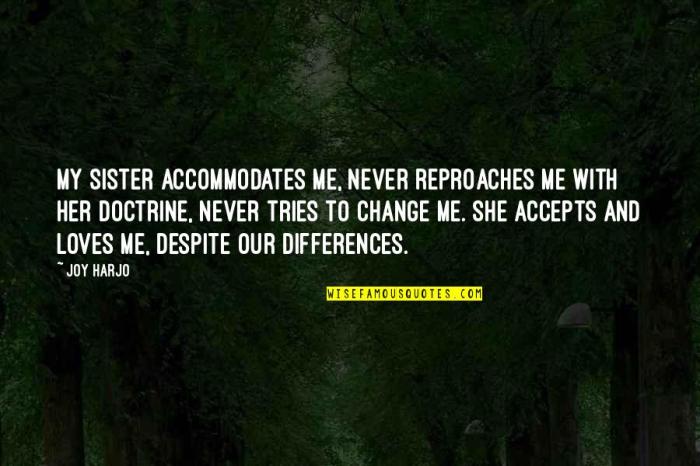
Chapter 8 of The Great Gatsbyfeatures a collection of insightful and evocative quotes that delve into several key themes that drive the novel’s narrative and character development. These themes include the complexities of love, the nature of dreams and illusions, and the pursuit of the American Dream.
The Deceptiveness of Love
One of the central themes explored in Chapter 8 is the deceptive nature of love. Gatsby’s unwavering devotion to Daisy, despite her shallowness and selfishness, highlights the illusions that can cloud one’s judgment when in love. Quotes such as, “He had come a long way to this blue lawn, and his dream must have seemed so close that he could hardly fail to grasp it,” illustrate the extent to which Gatsby’s love for Daisy blinds him to her true character.
The Fragility of Dreams
The quotes in Chapter 8 also emphasize the fragile and elusive nature of dreams. Gatsby’s pursuit of Daisy represents the American Dream, a belief that through hard work and determination, one can achieve their aspirations. However, as the chapter progresses, Gatsby’s dream begins to crumble, revealing the inherent fragility of such aspirations.
Quotes such as, “He had lost the old warm world, paid a high price for living too long with a single dream,” underscore the devastating consequences of chasing an unattainable ideal.
The Illusion of the American Dream
Chapter 8 also explores the illusion of the American Dream. Gatsby’s success as a wealthy businessman is juxtaposed against his inability to truly belong in the upper class. Quotes such as, “The truth was that Jay Gatsby, of West Egg, Long Island, sprang from his Platonic conception of himself,” highlight the disconnect between Gatsby’s self-created image and his true identity.
The chapter suggests that the American Dream is often an illusion, leaving behind a sense of emptiness and dissatisfaction.
Symbolism and Motifs in Chapter 8 Quotes
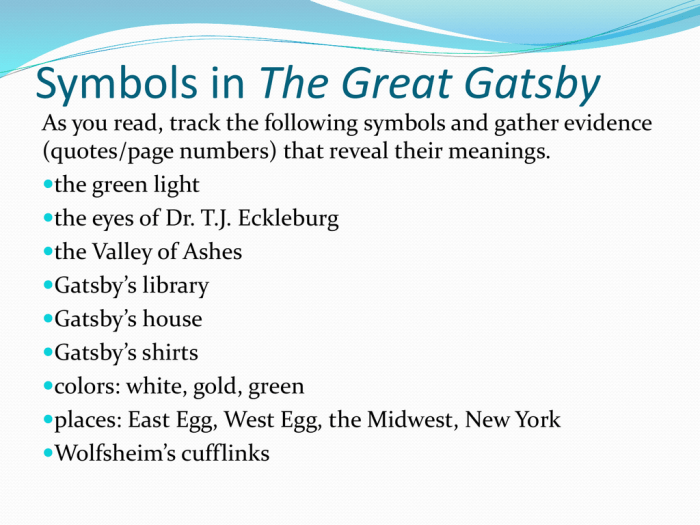
Chapter 8 of The Great Gatsbyis replete with symbolism and motifs that enhance the meaning and significance of the quotes. These literary devices create a deeper layer of understanding and interpretation, allowing readers to delve into the complexities of the characters and themes.
The Green Light
The green light at the end of Daisy’s dock is a powerful symbol of Gatsby’s unattainable dream. It represents his hope for a future with Daisy, a past that he cannot recapture. The light’s elusive nature mirrors Gatsby’s own elusive pursuit of his desires.
“He stretched out his arms toward the dark water in a curious way, and, as far as I was from him, I could have sworn he was trembling. Involuntarily I glanced seaward—and distinguished nothing except a single green light, minute and far away, that might have been the end of a dock.”
The Valley of Ashes
The Valley of Ashes is a desolate wasteland that symbolizes the moral decay and social inequality of the 1920s. It is a stark contrast to the glamorous world of West Egg, representing the harsh realities of life for those on the lower rungs of society.
“About half way between West Egg and New York the motor road hastily joins the railroad and runs beside it for a quarter of a mile, so as to shrink away from a certain desolate area of land. This is a valley of ashes—a fantastic farm where ashes grow like wheat in the fields, belching out smoke from a white dump that has been burning for years.”
The Clock
The clock in the Plaza Hotel symbolizes the passage of time and the inevitability of change. It reminds Gatsby that his dream of recapturing the past is ultimately futile, as time moves relentlessly forward.
“Two o’clock and the meeting was dismissed. The room was empty save for a great clock, ticking on the wall, and a girl.”
Character Development in Chapter 8 Quotes
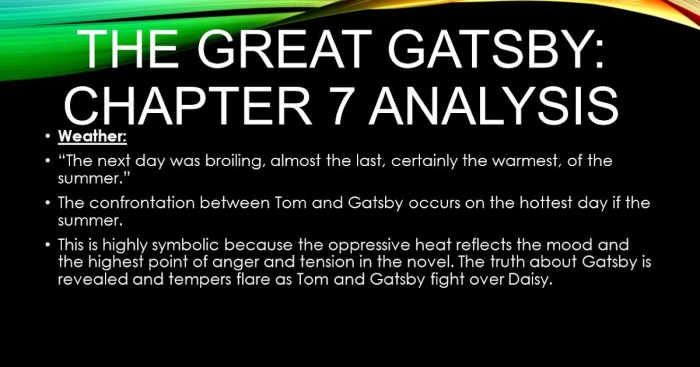
Chapter 8 of The Great Gatsby marks a pivotal turning point in the novel, revealing significant developments and transformations in the characters. The quotes from this chapter provide valuable insights into the motivations, relationships, and perspectives of the main characters, contributing to their overall character arcs and the progression of the plot.
Daisy Buchanan
Daisy’s character undergoes a significant shift in Chapter 8. Her initial superficiality and shallowness begin to give way to a deeper understanding of her own emotions and the consequences of her actions. This is evident in her admission to Nick that she is “careless” and “tired of all the foolishness.”
Her growing awareness of her own flaws sets the stage for her eventual realization that she cannot have both Gatsby and Tom.
“I’m careless. I’m tired of all the foolishness.”
Daisy Buchanan
Tom Buchanan
Tom’s true nature is fully revealed in Chapter 8. His arrogance, brutality, and racism become increasingly apparent, particularly in his treatment of Myrtle Wilson. His outburst at Myrtle, in which he calls her a “common fool” and tells her to “shut up,” exposes the depth of his disdain for those he considers inferior.
“She’s a common fool!”
Tom Buchanan
Jay Gatsby, Chapter 8 quotes great gatsby
Gatsby’s desperation and vulnerability are laid bare in Chapter 8. His frantic attempts to win Daisy back, even resorting to emotional manipulation, highlight his increasing instability. The realization that he cannot simply recreate the past with Daisy forces him to confront his own limitations and the futility of his dream.
“Can’t repeat the past? Why of course you can!”
Jay Gatsby
Literary Devices in Chapter 8 Quotes
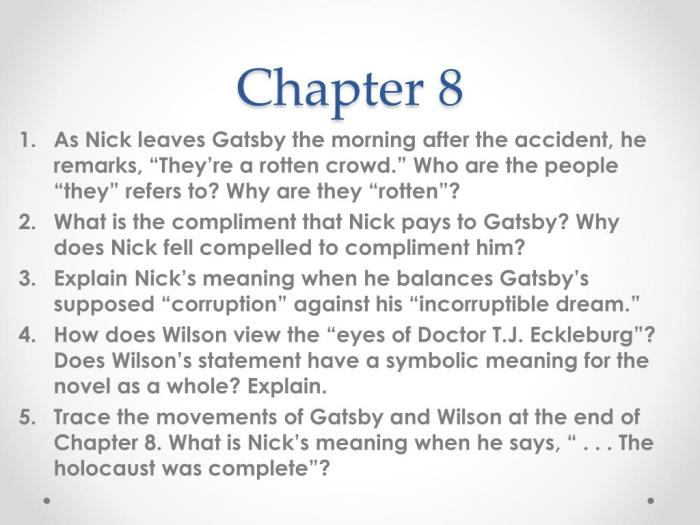
The quotes from Chapter 8 of The Great Gatsbyare rich in literary devices, which enhance their impact and meaning. These devices include metaphors, similes, and imagery, each of which serves a specific purpose in conveying the themes and emotions of the novel.
Chapter 8 of The Great Gatsby offers profound insights into the complexities of human nature. Its memorable quotes explore themes of love, loss, and the pursuit of the American Dream. While these themes resonate deeply with readers, they also find parallels in other works of literature, such as To Kill a Mockingbird . Both novels explore the complexities of societal norms, racial injustice, and the search for justice.
Metaphors
Metaphors are used to create vivid and memorable comparisons between two things. In Chapter 8, metaphors are employed to convey the complex emotions and experiences of the characters.
“The city seen from the Queensboro Bridge is always the city seen for the first time, in its first wild promise of all the mystery and the beauty in the world.”
This metaphor compares the view of the city from the Queensboro Bridge to the initial encounter with the unknown, suggesting the sense of wonder and anticipation that accompanies new beginnings.
Similes
Similes are similar to metaphors but use the words “like” or “as” to make the comparison explicit. In Chapter 8, similes are used to emphasize certain qualities or characteristics of the characters and their experiences.
“He smiled understandingly–much more than understandingly. It was one of those rare smiles with a quality of eternal reassurance in it, that you may come across four or five times in life. It faced–or seemed to face–the whole external world for an instant, and then concentrated on you with an irresistible prejudice in your favor. It understood you just as far as you wanted to be understood, believed in you as you would like to believe in yourself, and assured you that it had precisely the impression of you that, at your best, you hoped to convey.”
This simile compares Gatsby’s smile to a rare and precious gem, highlighting its exceptional qualities and the profound impact it has on the narrator.
Imagery
Imagery appeals to the senses, creating vivid mental pictures in the reader’s mind. In Chapter 8, imagery is used to evoke the atmosphere and setting of the novel, as well as the emotional states of the characters.
“The city seen from the Queensboro Bridge is always the city seen for the first time, in its first wild promise of all the mystery and the beauty in the world. A dead man passed us in a hearse heaped with blooms, followed by two carriages with drawn blinds, and by more cheerful cars led by a limousine and filled with half a dozen bridesmaids and the ushers. Taxis swarmed about the entrance to the morgue, awaiting the ambulance calls, while ambulances stood massed along the curb, siren in hand.”
This passage uses vivid imagery to create a sense of contrast between the vibrant city and the somber procession of a funeral, highlighting the juxtaposition of life and death that is a recurring theme throughout the novel.
Style and Tone in Chapter 8 Quotes

The quotes from Chapter 8 of The Great Gatsby exhibit a distinct style and tone that contribute to the overall atmosphere and mood of the chapter. The language, syntax, and structure used in these quotes create a sense of nostalgia, longing, and disillusionment.
The language in the quotes is often poetic and evocative, with Fitzgerald employing rich imagery and sensory details to create a vivid and immersive experience for the reader. The syntax is frequently complex, with long, winding sentences that reflect the characters’ introspective thoughts and emotions.
The structure of the quotes also contributes to their impact, with many of them being brief, fragmented utterances that capture the characters’ fleeting thoughts and feelings.
Nostalgia and Longing
Many of the quotes in Chapter 8 express a sense of nostalgia and longing for the past. The characters reflect on happier times, and their words are imbued with a bittersweet longing for what has been lost. For example, Gatsby’s quote, “Can’t repeat the past? Why of course you can,” reveals his desperate desire to recreate the past with Daisy.
Disillusionment
The quotes in Chapter 8 also convey a sense of disillusionment with the American Dream. The characters have come to realize that the dream is often unattainable, and their words reflect their disappointment and bitterness. For instance, Tom’s quote, “The rich are different from you and me,” highlights the vast social and economic divide that separates the wealthy from the rest of society.
Overall, the style and tone of the quotes in Chapter 8 of The Great Gatsby contribute to the chapter’s themes of nostalgia, longing, and disillusionment. The language, syntax, and structure of these quotes create a vivid and immersive experience for the reader, capturing the characters’ complex emotions and the bittersweet atmosphere of the chapter.
Cultural and Historical Context of Chapter 8 Quotes: Chapter 8 Quotes Great Gatsby
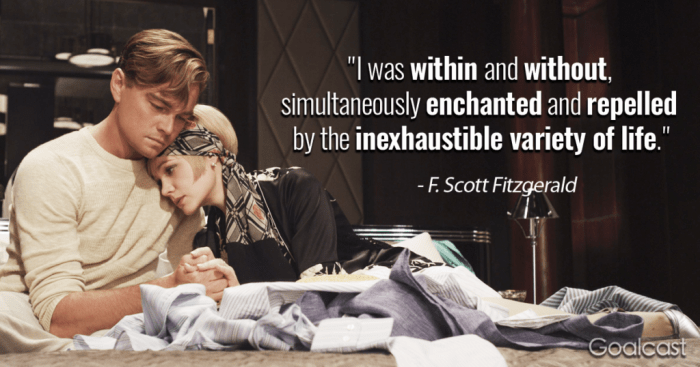
The quotes from Chapter 8 of The Great Gatsby offer insights into the social, political, and cultural norms of the 1920s, a time of significant change and upheaval in American society. The novel’s exploration of themes such as wealth, class, and the American Dream is deeply rooted in the historical context of the period.
The Roaring Twenties was a time of economic prosperity and social transformation. The United States had emerged from World War I as a global superpower, and the nation experienced a period of rapid economic growth. However, this prosperity was not evenly distributed, and the gap between the wealthy and the poor widened.
The quotes from Chapter 8 reflect the social and cultural tensions of the time. The characters’ conversations reveal the changing attitudes towards wealth, morality, and the role of women in society. The novel also explores the impact of the automobile on American culture, which transformed transportation and leisure activities.
The American Dream
The American Dream is a central theme in The Great Gatsby. The novel explores the ways in which the pursuit of wealth and success can corrupt and destroy individuals. The quotes from Chapter 8 reveal the characters’ complex and often contradictory attitudes towards the American Dream.
- “Can’t repeat the past? Why of course you can!” (Gatsby)
- “I’m going to fix everything just the way it was before” (Gatsby)
These quotes show Gatsby’s desperate desire to recreate the past and recapture the American Dream. However, Gatsby’s dream is ultimately unattainable, and his pursuit of it leads to his tragic downfall.
Wealth and Class
The novel also explores the ways in which wealth and class divide American society. The characters in Chapter 8 come from a variety of social backgrounds, and their interactions reveal the tensions between the wealthy and the poor.
- “He had come a long way to this blue lawn, and his dream must have seemed so close that he could hardly fail to grasp it” (Nick)
- “You can’t repeat the past?” (Daisy)
- “Can’t repeat the past? Why of course you can!” (Gatsby)
These quotes show the different ways in which the characters view wealth and class. Gatsby sees wealth as a means to achieve his dreams, while Daisy sees it as a way to maintain her social status. Nick, on the other hand, sees the emptiness of both Gatsby’s and Daisy’s dreams.
Morality and Values
The novel also explores the changing moral values of the 1920s. The characters in Chapter 8 engage in a variety of questionable behaviors, and their actions reveal the breakdown of traditional moral values.
- “I’m going to fix everything just the way it was before” (Gatsby)
- “Can’t repeat the past? Why of course you can!” (Gatsby)
These quotes show Gatsby’s desperate desire to recreate the past and recapture the American Dream. However, Gatsby’s dream is ultimately unattainable, and his pursuit of it leads to his tragic downfall.
FAQs
What is the significance of the green light in Chapter 8?
The green light at the end of Daisy’s dock symbolizes Gatsby’s hope and longing for a future with her. It represents his unwavering belief in the possibility of recapturing the past and fulfilling his dreams.
How does the character of Tom Buchanan evolve in Chapter 8?
In Chapter 8, Tom’s true nature is revealed as he confronts Gatsby and exposes his lies. His arrogance and insecurity become increasingly apparent, and his actions foreshadow the tragic events that are to come.